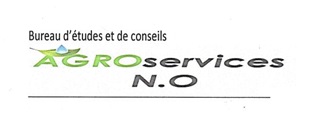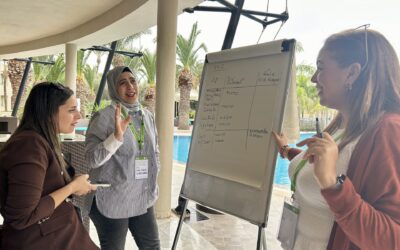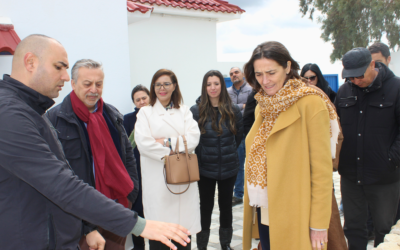TRACE – Tunisian Rural and Agricultural Chain of Employment
Support the job creation in the agricultural sector in rural areas in the frame of the programme TRACE.
The programme TRACE is financed by a donation of the Government of the Netherlands through a trust fund managed by the World Bank. The objective of the programme is to create employment targeting especially young people and women, in the rural, agricultural, and agri-food sectors, by enhancing productivity and resilience of small Tunisian producers. Furthermore, it aims at strengthening professional organisations’ and SMEs competitiveness thanks to a better access to knowledge, innovation and financial services.

Areas of intervention
A support fund, managed by the business consortium Microfinanza (Italy), ACK International (France) and AGER (Tunisia), is operational; this investment fund, which amounts to 3.2M US$, is available to make equity contributions to 220 businesses, which are often undercapitalised and which will be targeted by the project in the Governorate of Jendouba and from September 2023 in the Governorate of Béja, in the north-west of Tunisia.
Our target in Jendouba & Béja
- 60 projects by mid-2023
- 100 projects before the end of 2023
- 220 projects before the end of 2024

How we work
- Dialogue with partners and integration into the local ecosystem: private sector, financial and credit institutions (leasing, suppliers), public services, support programmes.
- Open window and mobilisation of specialised coaches, offering a tailored support to entrepreneurs: draw up a funding request, matching with financial institutions, post-financing monitoring.
- Targeting commercially viable investment projects to support sustainable employment, increased productivity and higher incomes.
- Taking account of quantitative and qualitative market demand, and aspects relating to social and environmental sustainability.
Supported entrepreneurs
funded projects
Permanent direct jobs created
Are you eligible for TRACE support?
You are :
-
- Farmer, stockbreeder, fisherman or aquaculturist, silviculturist?
- Collector, processor of agri-food products?
- Craftsman, tourism operator?
- Provider of services in the agricultural and agri-food sector?
- A mutual agricultural services company.
- Your business is an extension or a start-up.
- You are self-employed, a company or a group.
A few examples:
Are you a farm producer?
Agricultural producer, stockbreeder, fish farmer, fisherman, forester/forestry worker :
- your project concerns the intensification and diversification of crops, livestock, fishing and fish farming, forestry using environmentally sustainable methods ;
- your project involves the acquisition of equipment and works (construction/rehabilitation/extension of buildings), the purchase of inputs (working capital), the hiring of staff and a plan to strengthen technical capacity;
- plus points: your project is part of a sustainable approach to natural resource management and climate-smart agriculture/sustainable land management, contributes to improving the quality of agricultural products (certification), etc.
Are you a processor?
- Your project is in the field of developing cultural and natural resources through crafts and rural tourism, ecotourism, farm hospitality, educational farms, etc.
- your project includes the acquisition of equipment and works (construction/rehabilitation/extension of buildings), the purchase of inputs (working capital), the hiring of staff and a plan to strengthen technical capacities;
- plus points: your project is part of a sustainable approach to natural resource management and the promotion of sustainable tourism/ecotourism, and/or raising awareness of agro-ecology, climate-smart farming, sustainable land management, etc.
Are you a craftsman or tourist operator?
- Your project is in the field of developing cultural and natural resources through crafts and rural tourism, ecotourism, on-farm hospitality, educational farms, etc.
- Your project includes the acquisition of equipment and works (construction/rehabilitation/extension of buildings), the purchase of inputs (working capital), the hiring of staff and a plan to strengthen technical capacities;
- plus points: your project is part of a sustainable approach to managing natural resources and promoting sustainable tourism/ecotourism, and/or raising awareness of agroecology, climate-smart agriculture and sustainable land management.
Are you a service provider?
- Your project involves providing advisory support to producers and processors across all or part of the value chain (production, collection, transport, processing, storage, marketing, etc.);
- Your project includes the acquisition of equipment and works (construction/rehabilitation/extension of buildings), the hiring of staff and a technical capacity-building plan;
- plus points: your project is part of a sustainable approach to managing natural resources and promoting sustainable agri-food systems (certification and quality, etc.).
Eligibility criteria
- Your investment project is worth between USD 25,000 and USD 100,000, i.e. between TND 50,000 and TND 300,000.
- It can create new jobs (indicative target: 3 to 4 direct jobs per project).
- The financing plan must include credit (bank, customer, supplier, leasing, etc.) covering at least 50% of the investment.
- Your project meets the environmental and social requirements of the World Bank.
What are the support phases?
Identification
- Communication
- Open counter
- Identification of project leaders eligible for support
Maturation
1 month
- Tailor-made support for project leaders in preparing their funding applications
- Support for matching with a financial institution
- Submission of the funding application
Follow-up
3 months
- Payment of TRACE contribution after signature of partner FI loan contract
- Support for setting up intangible services
- Monitoring, evaluation and capitalisation
TRACE contribution :
It corresponds to a maximum of 30% of the amount of the investment[1], broken down into :
- 14% in support for equity capital (reinforcement of personal contribution)
- 16% in intangible support (training, administration, certification, insurance, etc. (non-exhaustive list).
NB: The TRACE contribution is compatible with other support from the State or other financial partners (subsidies or premiums), as long as the share of credit remains above 50%, and the project owner contributes 5 to 10% in equity (in the case of an extension, the valuation of the capital is excluded from the evaluation of equity).

[1] Investment = equipment + cash working capital. The value of capital (livestock, equipment, land, buildings, etc.) is not taken into account in the equity provided for this calculation.
Are you interested? Contact us!
For more information on the TRACE programme, please contact us.

Guichet TRACE – Jendouba
Centre d’affaires North Solutions Coworking à Bousalem
More information
PHONE : +216 78 633 400
E-MAIL : tracejendouba@microfinanza.com
ADRESS : Cité el hedi khlil 8170 Bou Salem, Tunisie (link google maps)
FACEBOOOK : North-Solution-Coworking NSC
Guichet TRACE – Béja
Agro services – Béja
More information
PHONE : +216 39 192 216
E-MAIL : tracebeja@microfinanza.com
ADRESS : Avenue de l’Environnement, Immeuble B, 1er étage, BEJA (link google maps)
PLATEFORME Tamweeli
More information
Our partner is specialised in putting entrepreneurs in touch with financial institutions. Register and generate a new financing request. Once you have entered your project details, select “TRACE Jendouba” in the “support organisation” box. If your application meets the eligibility criteria, it will be automatically forwarded to and studied by our team, and we will get back to you as soon as possible.
Complaints handling procedure
Making a complaint about TRACE-Jendouba-Beja services and procedures
When you receive services and are accompanied by the TRACE – Jendouba/Béja team, if your expectations have not been respected or if you are dissatisfied, you can submit a complaint in accordance with the procedures indicated.
1. Guiding principles for handling complaints
As stated in the MOP, all complaints relating to abuse, ill-treatment and procurement are submitted in good time to Microfinanza as lead partner of the TRACE Jendouba project consortium.
Once complaints are received, they are analysed and a response is sent. Delays should be avoided to prevent unnecessary disruption to the procurement process and project implementation.
All complaints are recorded by Microfinanza in a folder – Excel file to be archived on the management system according to its internal procedures.
Any complaint that could involve allegations of fraud or corruption requires special handling[1].
A dedicated consultation with the World Bank could be made, if additional measures prove necessary.
[1] Examples of fraud include: false invoicing, use or presentation of false, inaccurate or incomplete statements or documents resulting in the improper collection or retention of funds from the budget allocated to the TRACE programme; failure to provide information in breach of a specific obligation, with the same effect; misappropriation of such funds for purposes other than those for which they were originally granted. Examples of corruption committed by those involved in the TRACE programme include: exchanging confidential or privileged information with a supplier during the procurement process in order to give it an advantage over other suppliers; biased or delayed applications; unjustified or abusive evaluation and award criteria; obtaining undue commission; taking decisions based on the interests of corrupt staff rather than the good of the TRACE programme.
2. Reception of complaints
Only complaints received in writing on the electronic mailbox / email tracejendouba@microfinanza.com will be processed. A complaint is also an opportunity to improve the qualitý of the actions promoted by the project. The complainant is not required to state his/her
identitý. The time limit for handling complaints is 7 days. For any complaint received, the designated person works a file.
The complaints procedure is disseminated and easily available on the https://www.microfinanza.com/fr/trace-project/ website so that anyone wishing to lodge a complaint is aware of it and knows who to contact if necessary .
3 Admissibility of the complaint
When a complaint is received, the nature of the complaint must first be determined in order to decide whether it is admissible, and then the strategy for dealing with it must be defined.
- If the complaint concerns abuse or mistreatment by staff, it is reported immediately to the Project Manager and the team works together to manage the complaint and provide the complainant with an appropriate response.
- If the complaint relates to a fact or situation concerning procurement, the Operational Coordinator, in collaboration with the procurement expert and the designated coach, will deal with the complaint by gathering evidence or concrete facts that will enable a conclusion to be drawn.
A complaint may be well-founded for the complainant but not proven or demonstrable. In this case, the complaint will have served as an awareness-raising or prevention tool.
4. Handling complaints
The person appointed to follow up complaints sent to the box allows the complainant to explain the nature of his/her complaint, obtains the necessary information, determines whether the complaint is admissible, directs the complainant to the appropriate contact person if necessary, processes the complaint diligently and informs the complainant of the outcome of the findings. It also ensures follow-up and provides the necessary information to the Project Manager and the Operational Coordinator – to manage the complaint and formulate responses to the complainant. If the complaint concerns project staff, the response must be given by a designated member of the PMU (project manager).
In the event of a complaint about the awarding of contracts, a response will be formulated by the Operational Coordinator with the support of the contracting expert and the designated coach. Once the necessary responses have been provided, the complaint is archived.
The handling of the file is confidential in order to preserve the identitý of the complainant as well as the reputation of the person who is the subject of the complaint.
5. Complaints handling report
The person responsible for receiving complaints periodically informs the Project Manager – according to the updated file – about the complaints received, their nature, the way they were handled, the findings made and the results and follow-up resulting from them.
6. Conservation of the files
All files relating to complaints and documents demonstrating follow-up are confidential and kept in the Microfinanza archive. Only the designated person, the person empowered tò act in his/her absence or the person owning access to these documents have access to the archive.
Complementarities and synergies
Synergies and leverage
The TRACE programme complements and acts as a catalyst for existing schemes, in particular to facilitate access to finance for businesses (SME – FI relationship), but also to improve supply services (SME – producer relationship), equipment and input supplier services (SME – supplier relationship) and advisory support (SME – service provider, coach relationship). With a view to sustainability and maximising the impact in terms of direct and indirect jobs maintained or created, partnerships and dialogue are therefore essential to the success of the programme.
Technical assistance consists of training and supporting beneficiaries in drawing up funding applications (including business plans), designing and preparing investment projects, seeking grant and loan funding, and supporting the implementation of these projects.
To qualify for the TRACE contribution, the investment project must therefore obtain credit from a financial institution (all categories combined[1]). TRACE’s aim is to achieve a leverage effect: by co-financing a sustainable, job-creating project at 30%, the programme expects to facilitate substantial investments ($1.2m should enable $4m in financing to be mobilised). The link between the private sector and financial institutions will be strengthened: the scheme will enable project sponsors to consolidate their financing requests and reassure financial institutions, both financially (contribution to equity capital) and technically and economically (coach support and financing of technical services).
[1] Banking structures, microfinance institutions, leasing companies. The project will also cover supplier and customer credit.

Partnerships
Financial and credit institutions
The Microfinanza – ACK – AGER consortium therefore wants to establish a dialogue with financial institutions upstream to identify and support project sponsors likely to obtain a loan from these institutions and therefore be eligible for a contribution from the TRACE fund.
There is no exclusivity: the project owner retains the choice of financial institution, and the consortium promotes matching between project owners and financial institutions through the Tamweeli.tn platform.
Suppliers of agricultural inputs and equipment that can offer supplier credit solutions, leasing companies and producer groups that supply companies can be mobilised on a case-by-case basis.
Local and national institutional partners
Whether they are public (development agencies, CRDA, APIA, authorities, etc.) or private (professional organisations, chambers of commerce, business centres, etc.), these partners have a local presence and know the players and businesses in their area.
They can therefore help to identify project leaders who are already at an advanced stage and eligible for the TRACE contribution, and can also relay the communication to reach the target audiences more widely. Other national and international partners will also be informed of opportunities, so as to highlight any opportunities for collaboration and synergy.
Similarly, support projects for entrepreneurs and young people, such as Agripreneur2.0 (GIZ) or other donor-funded schemes (EU, AFD, Italian cooperation, etc.) are likely to have databases of entrepreneurs potentially eligible for the TRACE programme.
Technical partners
North Solutions Coworking, a private business centre in Bousalem. This centre will be open on working days to receive project leaders, who will then be directed to the PMU and the coaches to help them draw up their funding applications, subject to their eligibility.
Our partner in Béja in Agro Services N.O engineering and consultancy office.
The premises will serve as a base for the PMU during its missions, and as a place for coaches and project leaders to work together to draw up funding applications. The same premises will be used for meetings or information and training sessions for coaches and project leaders.
The public business centre in Jendouba, under the aegis of the CCINO. This centre is specialised in supporting young entrepreneurs, will be able to act as an intermediary on the ground to identify potential project leaders.
Middle East Investment Initiative MEII is a non-profit organisation working to promote the financial inclusion of SMEs in Tunisia and the MENA region. To this end, MEII has set up the TAMWEELI programme for Tunisian small and medium-sized enterprises (SMEs). The Tamweeli programme is based on two main components: Tamweeli ASSIST, which consists of support for improving communication and financial and accounting management for SMEs by equipping them with appropriate accounting or commercial management software, and then helping them to use this new tool and to understand the financial data in general; and Tamweeli PLATFORM, the first digital portal to link the supply and demand of financing in Tunisia. The Tamweeli.tn platform will be used to facilitate matching between supported project holders and financial institutions.
Manuals of the program
In this section, you can find the manuals of the program
Workforce Management Procedure & Working Conditions (Pgm)
The aim of the GMPs is to define good practice in the management and protection of health staff and all workers associated with the implementation of the project.
Manual of procedures (MOP)
Operational Manual of the Project to support economic growth and job creation in the agrifood and rural sectors.
Stakeholder Engagement
Plan
(MMPP)
The stakeholder engagement plan provides a means of raising their concerns and putting in place a mechanism to address and manage them.
Environmental and Social Management Framework (ESMF)
The ESMF sets out the team’s responsibilities for assessing, managing and monitoring the environmental and social risks and impacts associated with the project.
Environmental and Social Commitment Plan (Escm)
The manual contains a summary of the key measures and actions to mitigate the potential environmental and social risks and impacts of the project.
Last news
Capacity Building in Agricultural Risk Management: Insights from a training by PARM
Capacity Building in Agricultural Risk Management: Insights from a PARM Training October 2024 From...
Ambassador of the Netherlands Josephine Frantzen visits Béja
Ambassador of the Netherlands Josephine Frantzen visits the governorate of BéjaFebruary 2024The...




